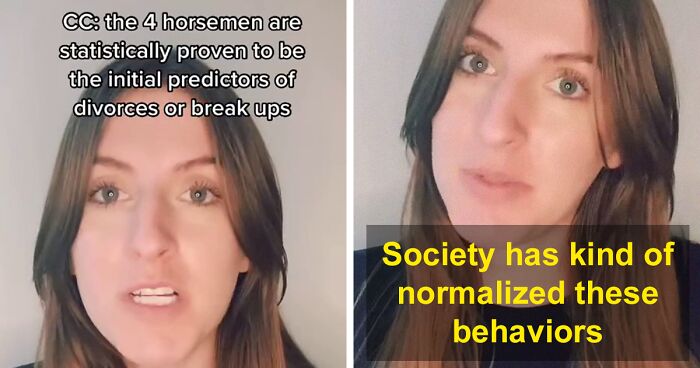
Relationship Coach Reveals The 4 Red Flag Behaviors That Predict Break-Ups Even Though Society Has Normalized Them
InterviewRelationships are a lot of work and both partners need to be putting in the effort to make it work. Unfortunately, it doesn’t always work out. And while many of us can keep guessing why our friends, seemingly ‘perfect’ couples, broke up, the fact is that we don’t have an inside view into their relationships. However, relationship experts can tell when a couple’s likely to break up, even if some behaviors have been normalized by society. In an informative video, relationship and self-love coach Alex Scot goes into detail about the ‘Four Horsemen’ behaviors that are initial predictors of divorce and break-ups so that people learn to stay away from them.
These behaviors are: contempt, defensiveness, stonewalling, and criticism. Check out Alex’s full video below and let us know what you think of her analysis in the comment section, dear Pandas. Which of the four behaviors have you had to deal with and which do you personally find to be the worst?
Relationship coach Alex based her video on The Gottman Institute’s research into what makes relationships more likely to fall apart.
Alex told Bored Panda that even the ‘Four Horsemen’ of relationships doesn’t have to mean that the relationship is finished: there are ‘solutions’ to each red flag behavior. “Each Horseman has what Gottman calls an ‘antidote,’ meaning these behaviors can be fixed,” the relationship coach said, adding that the relationship can be saved, as long as both sides are “willing and committed to course-correcting.”
More info: TikTok | Instagram | YouTube | AlexScot.com
Alex explained what the ‘Four Horsemen’ of relationships are in a viral TikTok video
@thealexscot#relationshiptopics#relationshiplesson#toxicrelationshipgoals#toxiclovers#healthyrelationshipafteratoxicone#healthylovelife#relationshipdonts♬ original sound – Alex Scot
For instance, Alex explained to Bored Panda what the antidote for criticism is according to Gottman. In this case, it’s a so-called ‘soft-start-up.’
“This is basically leading with an ‘I’ statement to state your feelings, and then requesting to discuss the subject now. For example, “I’m still feeling overwhelmed from what occurred the other night. Is now a good time for you to discuss it?” And here’s the catch: your partner is allowed to say ‘no,’ and to propose a time that does work for them,” relationship coach Alex went into detail with Bored Panda.
“The goal here is to stop initiating heated discussions with character accusations like, ‘You’re so lazy! You never pick up after yourself,’ and instead to use the soft start-up to get the ball rolling and to prevent your partner from getting defensive.”
Meanwhile, the antidotes for defensiveness and stonewalling are, respectively, taking responsibility for your part in the relationship, as well as focusing on self-soothing and taking the time to calm yourself down.
These behaviors all make it more likely that the relationship will end
Image credits: thealexscot
Image credits: thealexscot
Alex shared some other great relationship tips and tricks in some of her other videos which you can watch in full right here
@thealexscot#fightfair#healthyfight#argument#relationshipargument#relationshipconflict#relationshipfightsbelike#relationshipfights♬ Calm LoFi song(882353) – S_R
@thealexscot#healthyrelationshipafteratoxicone#healthylovelife#partnership_goals#relationshipsgoal#lovelifegoal#healthylover#healthyrelationships2021♬ Lazy Sunday – Official Sound Studio
Image credits: thealexscot
The relationship coach also explained how some people can spread toxicity in their relationships without even realizing it
@thealexscot#toxiclovers#toxicorhealthy#toxicrelationshipchallenge#toxicrelationshipscheck#unhealthylove#unhealthyrelationships#relationshipchecheck♬ original sound – Alex Scot
Image credits: thealexscot
I was also very interested to learn more about how Alex became a relationship coach and decided that she wants to help people with their love lives. She was very open about the fact that she became a coach by accident.
“I was raised in a household with narcissistic abuse and religious trauma, which led me to be married at 20 and divorced at 23. I found myself single at the peak of the dating app craze, and after a few toxic relationships found on Bumble and Hinge, I hit my rock bottom—and that’s when the magic happened. I realized that I was the common denominator within all of my relationships, so I asked myself, ‘What is so broken inside of you that allows you to accept mistreatment?’”
She continued: “It was then that I started digging and researching during my free time, and that led me to connect the dots between my adult love life and my childhood. That’s when I learned about how our bodies and brains are designed to keep us ‘safe’ by seeking out what they’re familiar with—even if we logically know it’s bad for us. So, for me, I was gaslit and verbally, emotionally, and mentally abused throughout my childhood, and as a result, I was attracting and picking men with the same behaviors.”
That’s when Alex focused on unlearning the things that she was taught as a child while also “emotionally regulating to get my nervous system onboard,” and picking up new healthy relationship skills that would, in turn, lead to a healthy and secure relationship that she craved.
Thankfully, things turned out well. “I’m happy to report that I did it! Now I am so thankful to have a partner who understands my past, loves me through and through, is dedicated to his personal development, and grows with me as a couple. I’m passionate about what I do because I know what broken and hopeless feels like, and I don’t feel anyone on this planet deserves to feel that way. If I can impact the world by teaching people the tools and techniques I’ve implemented to change my own life for the better, then I’m all for it!”
Alex added that she’s always open to hearing from people via social media and other channels and all that she cares about is that others get what they want out of life. She also offers one-on-one coaching, as well as two courses (one of which is all about developing your relationship skills, the other focusing on self-healing techniques, cultivating self-love, and discovering your authentic self).
“I would just like to say that anyone out there who has experienced the same type of relationship over and over again, or feels like they are doomed when it comes to love: you are worthy of the love that you dream about, and it absolutely is possible to achieve if you are willing to heal and learn new skills.”
Here’s how some TikTok users reacted to relationship coach Alex’s informative video
The biggest and baddest of the ‘Four Horsemen,’ contempt, is pretty much self-explanatory: it’s when you feel superior to your partner and you openly show this while talking to them. The Gottman Institute points out that those couples that are contemptuous of each other actually have weakened immune systems and are therefore more likely to suffer from infectious illnesses like colds and the flu.
Meanwhile, defensiveness is all about not being open-minded enough. Instead of hearing out your partner and being open to changing your beliefs, you always play devil’s advocate.
The third red flag is stonewalling aka shutting down completely aka the silent treatment, while the fourth and final ‘Horseman’ is criticism. The latter is fine if it’s a specific action or situation that you’re complaining about, however, it’s not all right to criticize your partner’s character as a whole.
For instance, being upset that your partner didn’t take out the trash (again, for the tenth time this month) and complaining about it is fine. But saying that they’re rotten to the core and lazy because they can’t even complete a simple chore would be an absolutely horrendous thing to do.
Relationship coach Alex aims to help millennial women “stop the crazy train of volatile relationships by healing past wounds and developing the skills necessary for healthy, stable, and enjoyable love.”
Statistics can never "prove" a thing. Statistics can be used to give you an idea of the likelihood of something happening by a cause and not randomly. Even if there are valid statistics, where are they cited? The advice on how to treat your partner is valid and absolutely warranted, but implying scientific backing where there is none (or where the OP fails to correctly reference it) is very questionable. I also do no think that "Society Has Normalized" "red flag behaviours" as the title suggests – again, there is no evidence for that other than anecdotal truth.
Yeeah man, thanks for the correction! As a statistics enthusiast I really appreciate your comment :)
Load More Replies...Hey here's an idea "coach". You are NOT a professional therapist nor are you Gottman trained as you have to be a licensed therapist as a masters level minimum. This is the problem with these "coaches" out there. There is no official training or certification, just bogus online stuff; anyone can advertise themselves as some kind of "coach" and watch a few free online videos then call themselves some kind of expert. Be very cautious taking any kind of advise or information from any of them. BTW anyone can go watch videos by the Gottman Institute on their youtube page or official website. Don't pay some hobum your good money for tools you can get free with a little on line research and a library card. Or go seek professional help/assistance from a licensed and trained professional. Not some hobum on tik tok
Statistics can never "prove" a thing. Statistics can be used to give you an idea of the likelihood of something happening by a cause and not randomly. Even if there are valid statistics, where are they cited? The advice on how to treat your partner is valid and absolutely warranted, but implying scientific backing where there is none (or where the OP fails to correctly reference it) is very questionable. I also do no think that "Society Has Normalized" "red flag behaviours" as the title suggests – again, there is no evidence for that other than anecdotal truth.
Yeeah man, thanks for the correction! As a statistics enthusiast I really appreciate your comment :)
Load More Replies...Hey here's an idea "coach". You are NOT a professional therapist nor are you Gottman trained as you have to be a licensed therapist as a masters level minimum. This is the problem with these "coaches" out there. There is no official training or certification, just bogus online stuff; anyone can advertise themselves as some kind of "coach" and watch a few free online videos then call themselves some kind of expert. Be very cautious taking any kind of advise or information from any of them. BTW anyone can go watch videos by the Gottman Institute on their youtube page or official website. Don't pay some hobum your good money for tools you can get free with a little on line research and a library card. Or go seek professional help/assistance from a licensed and trained professional. Not some hobum on tik tok

 Dark Mode
Dark Mode 

 No fees, cancel anytime
No fees, cancel anytime 









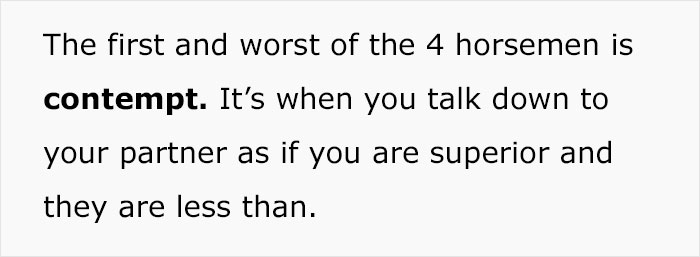
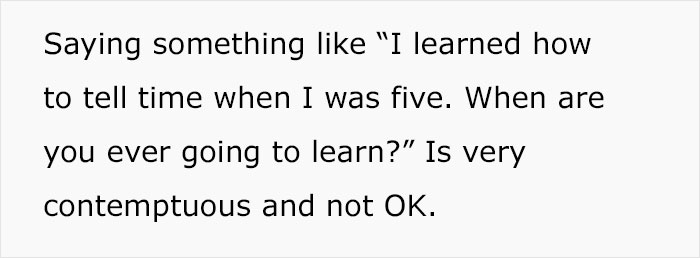
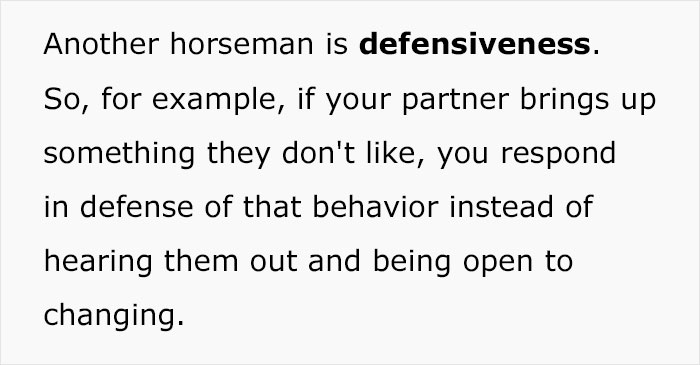

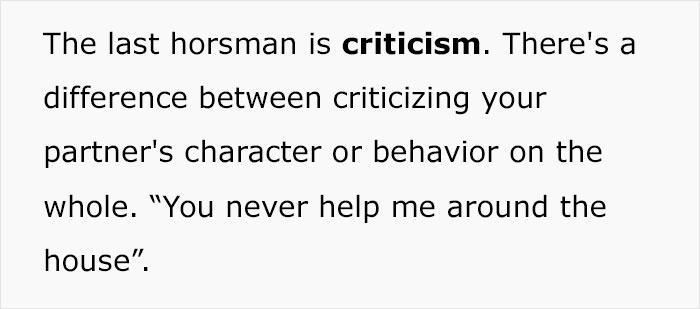
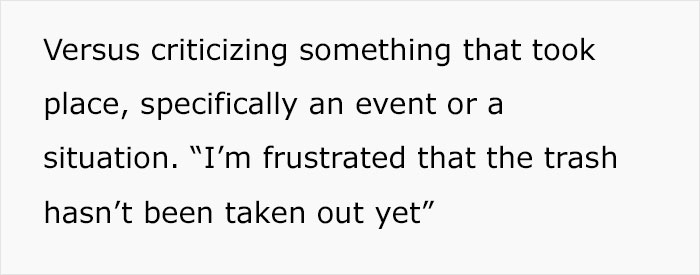










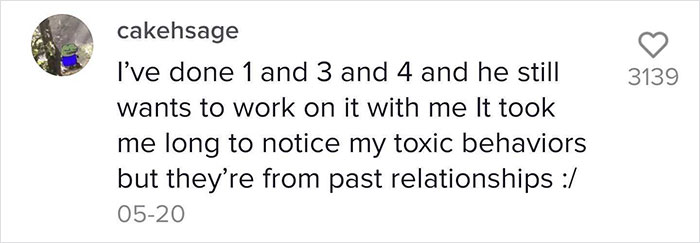
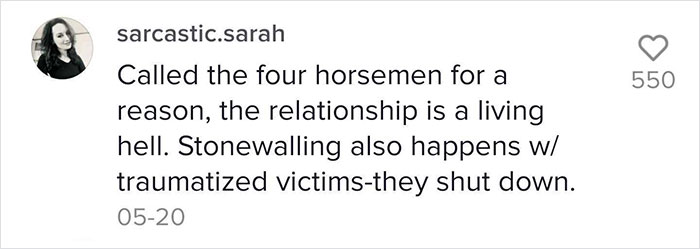
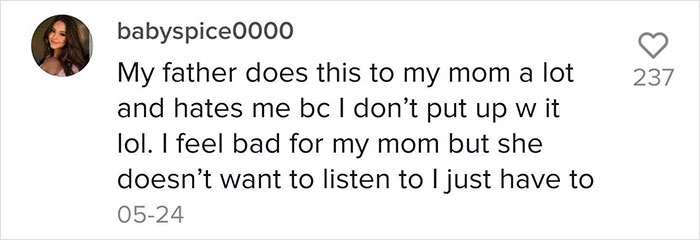









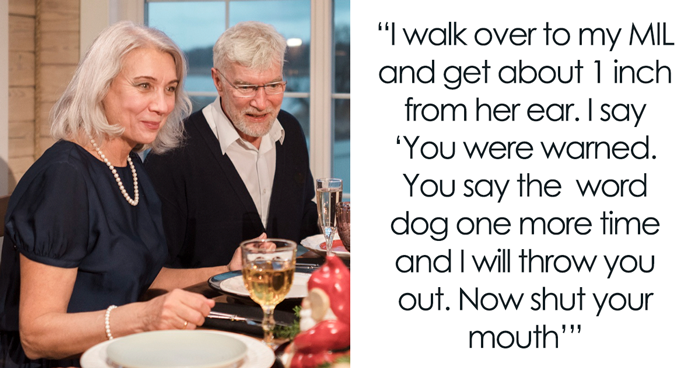

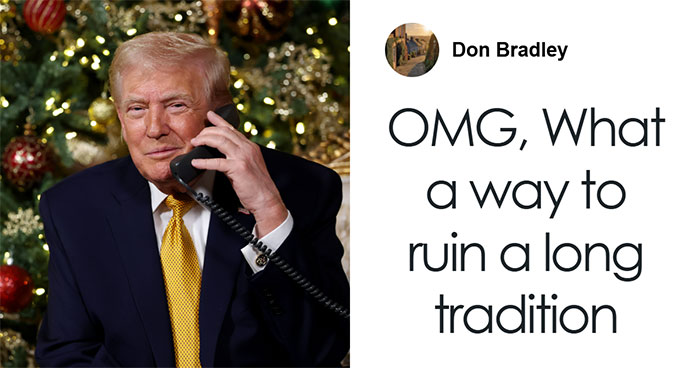

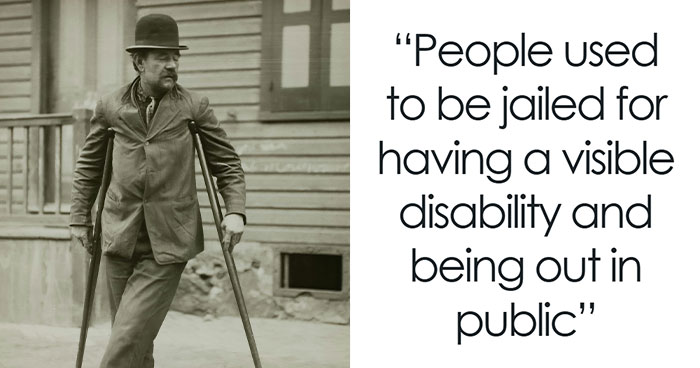
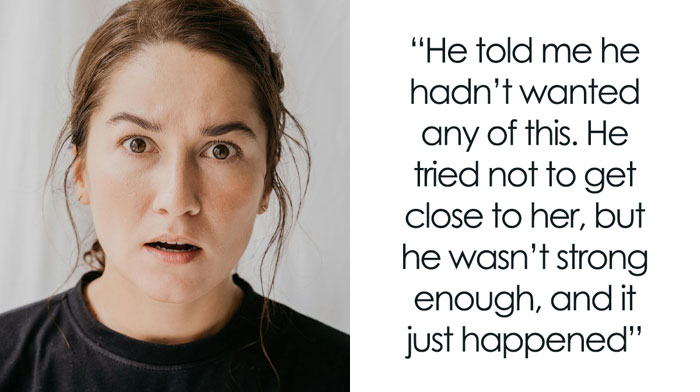
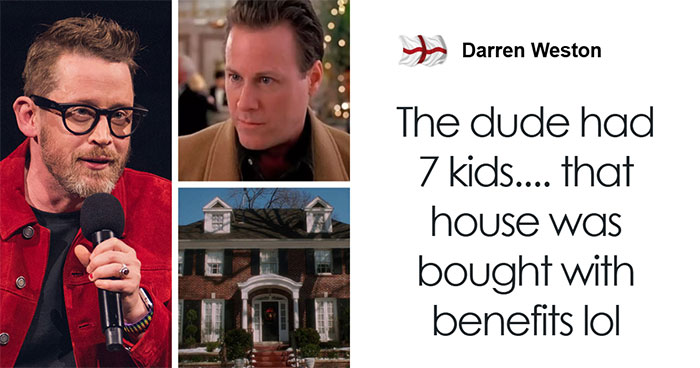
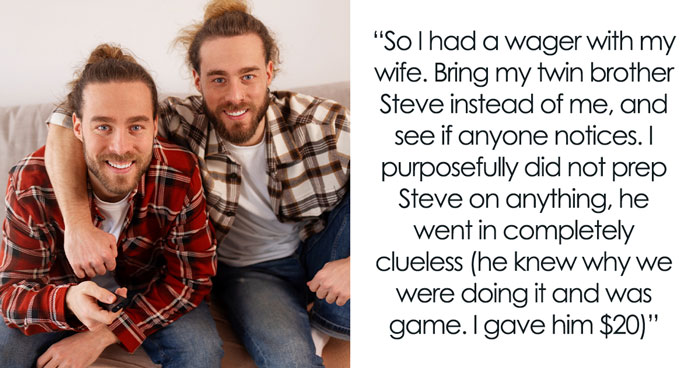






























80
24